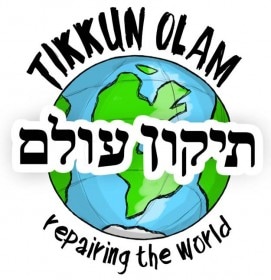Tikkun Olam. These two Hebrew words mean, roughly, the "healing" or "repair" of the world. In Tikkun Olam we see an essential part of the Jewish worldview. Although some of us may decry the modern day Jew's insistence that she has been chosen by God, and while many of us wonder why the West continues to support Israel even when its government appears to suppress the Palestinians, those who hold either position may be missing the point. Tikkun Olam underscores that the Jewish people have not been chosen to strut their alleged greatness, but rather to work with their fellow human beings, and God, to heal the many fractures and contusions that afflict the planet. To join with the human race to make the world a better place for everyone, to repair the immense damage that human pride and folly and ecological malfunction have wrought through the many millennia of human existence.

In Tikkun Olam is a lesson for us all. Lest any of us suppose that we are here only to look out for ourselves and our loved ones, that we are free to pursue our own happiness at the expense of that of others, or that we can ignore the many ways that humanity has damaged the planet, Tikkun Olam reminds us that, in truth, none of us made themselves come into life on the planet. None of us are self-starting beings. And none of us can live as if no one else matters. To do so is to deny our humanity.
A German word, Sittlichkeit, or, roughly, an obligation to contribute to a common social or cultural good, captures the heart of Tikkun Olam. Our goal in living is to make living optimal for everyone.
And to rejoice as we do so.
What else, in the face of the profoundly personal transcendence moving through reality, can possibly matter?
No comments:
Post a Comment